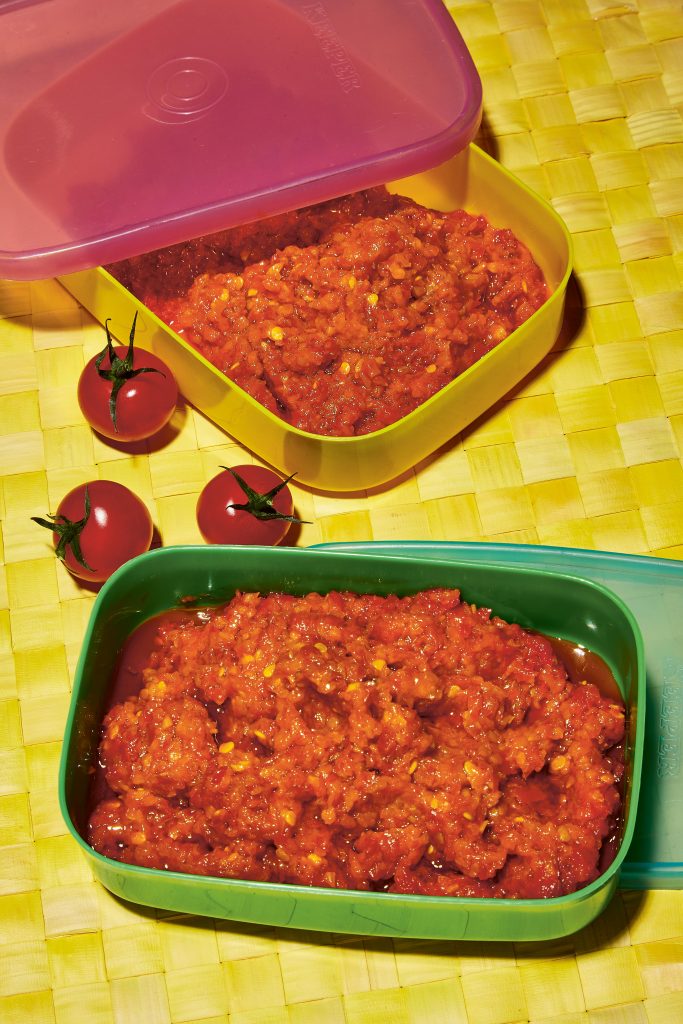
London-based Indonesian-Australian Lara Lee is a food writer, chef and co-founder of catering company Kiwi and Roo. Her first cookbook, Coconut & Sambal: Recipes from my Indonesian Kitchen (Bloomsbury) is named one of the Best Cookbooks of 2020 by The New York Times, Eater and The Guardian.
My passion for food was born from a very early age because my grandmother who was from Timor, Indonesia is not only an incredible cook, but also a baker. She owned a bakery to support her family because she was widowed at a young age. My dad migrated to Australia and married my mom who’s Australian. When we were little, my grandmother moved to Australia to live with us and we would have feasts of Indonesian food.
I wasn’t always a chef. Becoming a chef wasn’t an option for my parents but I always wanted to be a writer in some capacity. So, I studied media and journalism but accidentally fell into technology sales for the next 10 years. I was good at it but I spent all of my waking hours outside of work doing the other thing that I loved – food. I was cooking dinner parties for friends and family.
Since I moved to London nine years ago, I started to learn my grandmother’s recipes from my aunties and mum because my grandmother had already passed away. In 2016, I started selling these antipodean sandwiches alongside my friend at the local food market. I will be up till 2am in the mornings, and then we’d be at the market at 6am. When I realized that people wanted to pay for my food, I had the courage to quit my job.
When you’re craving to do the thing that you love,
you find the means to do it.
In 2017, I went to Leith’s cooking school for an intensive 9-month course. Then, I spent a few months being a stagier in a few Michelin starred restaurants around London. It was a dream come true and I am very grateful for these experiences. I’d also discovered a cookbook competition, the Yan Kit So Award. That was the very first time that I put pen to paper in terms of what Coconut and Sambal might be. When I started writing the proposal, a growing passion to reconnect with my Indonesian heritage ignited and I wanted to get to know my grandmother through her food. Quite wonderfully, I came runner up in that competition, and that gave me the confidence to keep going.
This experience also put me in touch with some incredible chef writers such as Fushchia Dunlop. I reached out to Sri Owen, a prolific Indonesian food writer, with my book proposal for her feedback and mentorship, and it quickly became this really wonderful friendship. She was like a foster grandmother to me. We would meet every week and cook these banquets together. She is the greatest influence on my Indonesian cookery.
Another crucial connection in my story is meeting Helen Goh (co-author of Sweet with Yotam Ottolenghi) , another influential food writer who introduced me to her literary agent. The next thing I know, I got a book deal with a publisher and started on this journey.

Prawn and Chicken Fried Noodles recipe from Coconut and Sambal
I spent the next two years intensely writing and researching and testing recipes for the cookbook. I wouldn’t change anything because this journey made me realize that food makes me feel the happiest, and Indonesian food is truly a pure joy for me.
There’s never going to be a point where you feel like the cookbook is perfect. I came back with 300 recipes and picking just 85 is a really difficult task. There’s a battle within yourself to be comfortable with what you’ve put together.
There are going to be days where you write five words. Then you sleep on it and wake the next day with a fresh pair of eyes. It’s just the most amazing thing beacuse suddenly, you’ve written 1000 words. I think it’s important to go through that process. In the same way that you would say to someone, “you should never rush cooking a curry”, you simply can’t rush writing a cookbook.
Writing a cookbook is a lot of work but it is the most rewarding thing apart from having a child.
You have to pour your life into it.

Two of the loveliest moments happened while traveling in Indonesia doing the cookbook research. The Indonesian culture is very welcoming, very kind, and very generous. A taxi driver, Pak Budi in Padang, West Sumatra took us to his home in the outskirts of Padang to meet his family.
For two days in a row, we cooked his traditional Minangkabao (Cuisine of West Sumatra) family’s recipes alongside his mum and aunties in this little house that he’d built. We would sit on the floor, using simple tools (not a knife in sight) to create these dishes. I felt like I was being invited in on someone’s secret; being taught things that no one on the outside had ever heard of before. This shows you that you don’t need fancy equipment to cook good Indonesian food, what you need are passion and good produce.
My parents came along for the trip for six weeks, and we spent a lot of time with my aunties learning and cooking recipes together. Seeing my family come together and cook my grandmother’s recipe 17 years after her passing away was like a celebration of their lives. So, that was kind of the other really special part of writing this cookbook. I don’t think that all of us have gotten together like this since my grandmother’s funeral.
Coconut and Sambal is a celebration of my grandmother and of Indonesia itself. My dad and my Aunties told me that my grandmother would be so proud of me and that, to me, is just the most precious thing.

What’s in my kitchen pantry
- Kicap manis – In the book and my Instagram, I have a recipe to make your own. Of course a true kicap manis is far more complex in its make but I wanted to ensure that my book is accessible to all.
- Kaffir lime leaves – I would buy big tupperwares of it, frozen, from my Asian grocer
- Tamarind – To season anything from sambal to stir-fries. It adds the most wonderful flavour
- Terasek/belacan – Fermented shrimp paste, or fish sauce as a substitute, adds that umami element in Indoneisan dishes.
- Galangal – This is very different from ginger – in my book, they don’t substitute each other. I often keep them in my freezer, pre-minced, and in the ice trays.
- Candlenut – It helps to bind things together and adds a fragrant oil
- Lemongrass – Indonesian food is all about the fragrance and aroma. When I cook with other home cooks, we would bow our heads to the wok to smell the fragrance of the food – that’s how you tell when the spice paste is on its way and how we know things are doing well!
Oh, and chilis! The heat from chili, sourness from tamarind or kaffir lime leaves, the sweet-savoury balance of kicap manis, and the fragrance of the lemongrass with galangal – all together make Indonesian food layered and complex and memorable and warming and sensory.

View this post on Instagram
Images credit: Bloomsbury. Recipes excerpted from Coconut & Sambal: Recipes from my Indonesian Kitchen by Lara Lee. Reproduced by permission of Bloomsbury.
Coconut & Sambal: Recipes from my Indonesian Kitchen by Lara Lee is available at
Malaysia: Kinokuniya, Lit Books
Thailand: Kinokuniya
Singapore: All good bookstores
This interview has been edited for clarity and length. Interview and written by Theri B. Edited by Lim Aileen.











